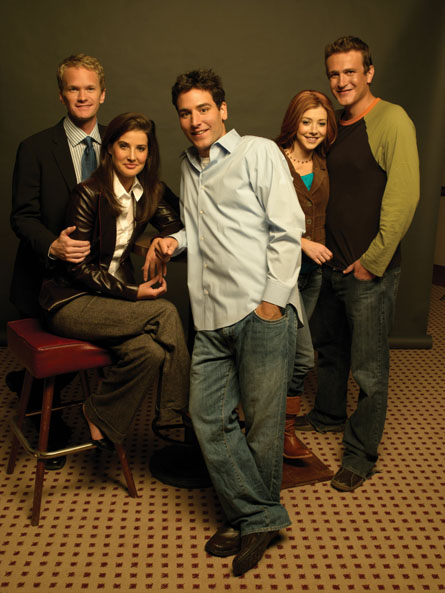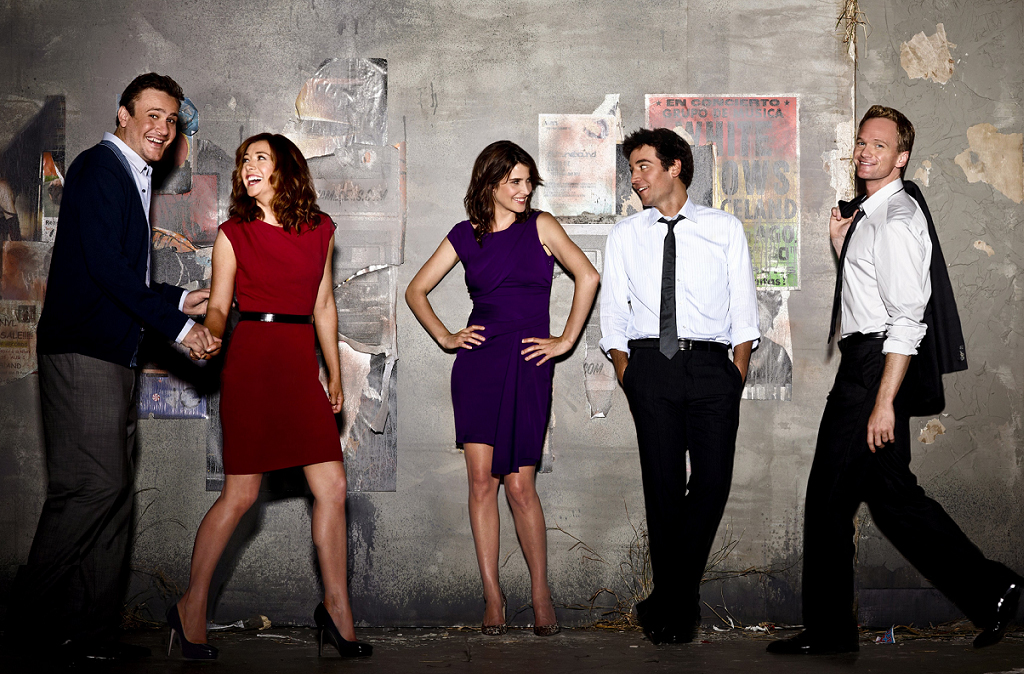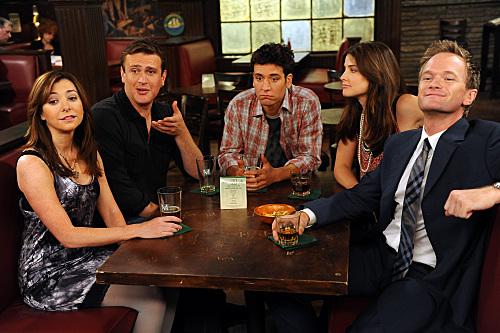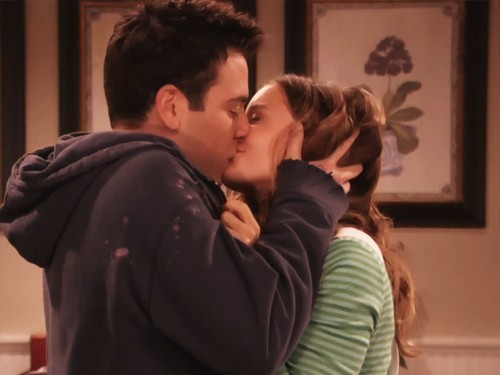Alex writes about where How I Met Your Mother stands after its seventh season, and how it remains underrated even though it’s no longer good.
It has become clear that seemingly everybody wants How I Met Your Mother to end. Cast member Jason Segel mentioned in a GQ interview that he kind of wishes it would go away, and if anybody was ever interested in interviewing Josh Radnor, I’m sure he would say the same thing. Even most fans of the show that I know seem to only continue to watch it out of some begrudging sense of duty, not unlike most of them probably felt during the final seasons of Lost. We’ve put so much time into the misdirections the show throws at us that we just need to find out what the conclusion will be, even though at this point we all suspect it will be underwhelming. I held out on joining the How I Met Your Mother hate train for as long as I could, talking up the great episodes and conveniently forgetting the bad, but as I watched the stunningly mediocre finale to the seventh season of How I Met Your Mother, I have started to put myself in the same category as the naysayers. Oddly, this does not change my general opinion on the show, as I still firmly believe it is wildly underrated… which is probably an impressive feat to accomplish, given that I’m no longer confident the show is actually good.
How I Met Your Mother’s first four seasons are, to put it mildly, awesome. When first watching the episodes, viewers tend to respond to the show’s non-linear method of storytelling, the puns and slang-based jokes, in addition to learning that Neil Patrick Harris seems to have been placed on earth exclusively to portray Barney Stinson*. Unfortunately, since the show used a laugh track and a multi-camera setup, when it debuted in 2005 I immediately wrote it off. (Keep in mind, this was at a time when watching a show staged similarly to Newhart was akin to claiming that MySpace is your favourite social networking site today. Arrested Development was winding up, 30 Rock was a year away from being a similarly great single camera sitcom, and The Office was the best show on network television.) It was clear that How I Met Your Mother was using an outdated format, and was therefore not worth my time. Of course, it would later become clear that these were the thoughts of an idiot.
*And/or host award shows.
When I finally began watching the show in 2008, at the behest of a friend who does not worry about the ideological implications of watching multi-camera sitcoms, it was immediately clear that this was a show for people like myself, if only because people like myself enjoy quality television. How I Met Your Mother was funny in a way few shows are; while most sitcoms were finding comedy from within actual situations, many scenes in How I Met Your Mother were based around little more than friends sitting around and telling legitimate, scripted jokes*. The use of wordplay in this show cannot be underrated; How I Met Your Mother is the best show since Seinfeld at implementing new terms into its audience’s vernacular, and whenever you’re the best at anything since Seinfeld, you’re doing something properly. What makes How I Met Your Mother unique, however, is its use of non-linear storytelling in a way that was at once obvious and so subtle most people never even think about it.
 *Keegan-Michael Key, from the underrated sketch show Key & Peele, told a story on a March episode of the Nerdist podcast that upon reading third season scripts for Will & Grace, he found that there were almost no actual jokes; every line was entirely dependent on the character saying it to get the laugh. The writers had established the characters well enough as funny entities that the writers didn’t need to write them jokes so much as Karen-esque things for Megan Mullally to say in the character’s well-known voice. Key’s argument was almost entirely true, as late-run sitcoms often move into places where they stop writing jokes in as much as they just write funny things the established characters would say. How I Met Your Mother falls into this trap at times, certainly, but the show generally uses a lot more actual jokes than typical late-run sitcoms, and very often the show’s biggest laughs aren’t dependent on who says the actual punchline. It’s pre-modern comedy told in a post-modern fashion.
*Keegan-Michael Key, from the underrated sketch show Key & Peele, told a story on a March episode of the Nerdist podcast that upon reading third season scripts for Will & Grace, he found that there were almost no actual jokes; every line was entirely dependent on the character saying it to get the laugh. The writers had established the characters well enough as funny entities that the writers didn’t need to write them jokes so much as Karen-esque things for Megan Mullally to say in the character’s well-known voice. Key’s argument was almost entirely true, as late-run sitcoms often move into places where they stop writing jokes in as much as they just write funny things the established characters would say. How I Met Your Mother falls into this trap at times, certainly, but the show generally uses a lot more actual jokes than typical late-run sitcoms, and very often the show’s biggest laughs aren’t dependent on who says the actual punchline. It’s pre-modern comedy told in a post-modern fashion.
Despite the vast majority of the show’s actual conflicts existing in the general time period the episode is broadcast by CBS, How I Met Your Mother never actually takes place in the present. In the logic of the show, the setting rarely leaves a middle-aged Ted Mosby’s living room in 2030. We’re not watching these twentysomething (and then later thirtysomething) characters experience meeting the Slutty Pumpkin inasmuch as we’re watching somebody recount the story of doing so. Similarly, our narrator is unreliable, if only because memory is inherently unreliable, particularly across the amount of time the show covers. And since all of the characters on this show are basically high-functioning alcoholics, Ted’s memory must be seen as even less reliable. (Given that he seems to remember both himself and Barney keeping each of their bars stocked with a spray bottle of seltzer in 2012, Ted is clearly making some shit up*.) Unsurprisingly, memories are often clearly exaggerated while being retold by the show’s characters, as stories tend to be when one is telling them while sipping on a scotch that is old enough to order its own scotch. This may be the fake story of How Ted Met that Person with the Yellow Umbrella Who was Once in Ted’s Class and I Think Temporarily Lived with Rachel Bilson, but even in the show’s unreal world, the characters’ version of reality can’t be trusted entirely.
*Look for them. They’re there, and they’re perplexing.
When I became mildly obsessed with How I Met Your Mother in the summer of 2009, I would drinking most of the time I would watch it. I was working for the government at the time, and when I wasn’t spending my time thinking about why I wasn’t a filmmaker of some sort or re-watching Josie and the Pussycats, I tended to be drinking with my friends. After I got home from meeting a friend for a drink, it just sort of felt right to watch a sitcom version of that same interaction made sense. (This must be how people who meet for coffee must have felt about Friends in the 1990s.) Art might imitate life, but I’m not going to pretend I never attempt the opposite. I would eat a sandwich and watch one or two episodes each night, and as I recall, I was perplexingly dedicated to this remaining a ritual for no real reason other than general absurdity. And while How I Met Your Mother was certainly good enough to watch sober, it always sort of felt right to have a drink while watching it. Of course, later seasons have turned the show into something I simply wouldn’t recommend watching while sober, like Keeping Up with the Kardashians, or Oprah, but until the fifth season the drink was more of an accompaniment than an actual necessity.
How I Met Your Mother has undoubtedly slipped in its later years, probably starting toward the end of the fourth season. Minus the great Barney-centric episode The Playbook, the fifth season is borderline worthless. The sixth season is a bit better (read: watchable), and the first half of the seventh season features some of the best moments in the entire series’ run. But the show should no longer be referred to as anything better than ‘mediocre.’ How I Met Your Mother is still Occasionally Great, but Occasionally Great will always be more disappointing than Consistently Shitty. Watching a good show like How I Met Your Mother, or The Office, in its later years, can be incredibly frustrating, if only because you remember how great the show once was.
I assume I started to like How I Met Your Mother as much as I do because I’m only slightly younger than the characters it focuses on. This is similar to why people in their late teens and early twenties helped make Garden State the most overrated movie of 2004: we see the Pineapple Incident, or Natalie Portman forcing people to listen to The Shins, assuming that’s what our life will be like in a few years. And that’s not only comforting to those of us who like to worry about the future, it’s borderline exciting. We’re watching people figure out the problems we assume we’ll have, and should we run into the same things, we now think we know the solution. It’s likely that when I’m 38, I’ll get really into reruns of Frasier, getting excited for my near future of drinking sherry, having David Hyde Pearce as a brother, and pontificating about the problems of my radio show’s callers*. But when we grow up, we realize that our mid-20s aren’t all about robbing graves with Peter Saarsgaard and listening to Zero 7, just like I’ll never spend all of my nights at a version of MacLaren’s with my four closest friends and a revolving door of sexy sitcom guest stars. But that probably didn’t happen for Ted Mosby, either. It’s all in how he (fake) remembers it.
*Also, casually using the word ‘pontificating.’
Despite this season’s dedication to mediocrity, one of the best episodes of How I Met Your Mother’s entire run aired earlier this year, an episode that is great mostly because it seems implausible that anything like this could ever happen. While at the Architects Ball, Ted runs into an ex-girlfriend of his named Victoria, a moderately adorable cake maker who went to Germany towards the end of season one to better learn how to make said cakes. The pair temporarily attempted a long-distance relationship, which failed when Ted decided that making out with Robin Scherbatsky was more fulfilling than talking to his actual girlfriend on the phone. When they see each other again, however, Ted decides to atone for his makeouts of betrayal by helping Victoria clean the dishes from the Ball, which she had been catering. While in Victoria’s kitchen, the two talk about what has changed in their lives; Victoria is now engaged to a German gentleman from her class named Klaus, with whom she was quite close while her and Ted were together. After various topics of discussion and a brief kiss, Victoria and Ted discuss why their own relationship didn’t work out, which leads Victoria to make some fairly ridiculous, sweeping statements about Ted’s friendship with Robin that end up defining the rest of the season.
The reason this episode is particularly interesting (aside from the fact that, you know, it’s funny) is because it seems exactly like the way Ted would recount the story of running into an ex, despite the fact that no run-in with an ex has ever gone this way. When people seem to have deep personal revelations like the ones Ted comes to here, they often tend to change the situation in which they learned them to better fit said revelation. This is like people that end up dating their best friend remembering Duckie and Andie getting together at the end of Pretty in Pink, despite the fact that the movie ends with Andie making out with Andrew McCarthy and his ludicrous wig. Of course you kissed her, Ted, and of course you learned something important about yourself in the process. Except for the fact that everybody you just told this story to kind of knew all of these things about you already, and you were simply the one that was slow to catch on.
Despite the show’s aforementioned laugh track and multi-camera visual aesthetic, How I Met Your Mother is not shot in front of an actual studio audience. As opposed to simply sweetening the laughs like most shows shot in this fashion do, How I Met Your Mother fabricates its laughs entirely. This seems odd upon initially thinking about it, but it also makes sense. These stories Ted is telling are a representation of something he experienced over a decade ago, and as details evaporate over the years, it seems appropriate that everything actually looks like a set, or an incomplete representation of the environment he’s talking about. If this were a single camera sitcom, shot the same way 30 Rock was, the locations would look too realistic as the camera moved around within them; they would look like places that actual people exist in, not sketches of people and places from your memory. Ted might not be conscious of this – he’s telling the story, not analyzing it – but the details will always be a little foggy in any story, particularly one that’s more than a decade old.
Similarly, close friends tend to have an odd memory attached to the time they’ve spent together. Ted seems to remember having been drinking with his friends at MacLaren’s pretty much every night he’s not on a date with an aforementioned sexy sitcom guest star, but that seems impossible. Robin, Marshall, Barney, and Lily do have lives, lives that involve teaching kids or litigiously saving the world or putting up with Sandy Rivers, so they can’t be together constantly. Besides, we’re only getting twenty or so adventures from the gang in each calendar year, so they must be doing other things that Ted simply deemed weren’t worth remembering, let alone retelling. And like the How I Met Your Mother crew, pretty much everybody seems to think this way about their own lives. There was a time when I was sure I was constantly hanging out with the person that introduced me to How I Met Your Mother, which can’t possibly have been the case. I’m sure we saw each other a lot compared to our other friends, but we also had separate lives that didn’t involve the other. We just remember things this way because these are the things in our lives that were meaningful; everything else has just sort of been forgotten with time, like nights when Ted decided to rewatch Annie Hall for the forty-third time, or when Robin goes right from work to the gun range to shoot off some rounds before bed. It seems unreasonable that I actually watched How I Met Your Mother every night for four months in the summer of 2009, but I got so attached to it that I certainly remember it as such. And the memory of what happens, despite its inherent flaws, often ends up being more important than the actual event itself.
How I Met Your Mother will end, and given that everybody’s contract expires after the end of season eight, I assume we only have one more year of the show before it becomes financially unreasonable for CBS to keep it going. I’m fine with this, but I’m certain I’ll still miss the show when it’s actually gone, regardless of how I feel about its recent level of quality. The end is on the horizon, and we all know that’s a good thing, but the memory of what it once was makes it seem like something we don’t want to go away. It almost needs to disappear out of necessity, to allow the people in the show to grow into the budding rom-com writer/directors or S.H.I.E.L.D. superspies that they’re capable of being. And I know How I Met Your Mother isn’t as good anymore as it once was, but I know that I may be more emotionally attached to it than ever, possibly for entirely unreasonable reasons. I’m remembering the show falsely in a way, but since I’m in charge of these memories, I’m also remembering it properly. Personal attachment elevates anybody’s feelings about a media product, just like Ted meeting up with Victoria seems more meaningful because he figured something out about himself during it. These might be unhealthy attachments, but all it does is show that the thing we’re talking about meant something, that it’s something that will forever be worth thinking about and remembering, even if what was so meaningful one day no longer actually exists. We’re all Ted Mosby until we realize our memories are just as flawed as his. But then we realize those flaws in life are what make anything worth remembering in the first place.







Comments
Really good article. Nice insight on Garden State. I watched it fairly recently and couldn’t figure out why my 2004 self loved it so much. I guess I had high hopes about having really complicated problems at this point in my life. no luck so far.
Thanks for reading. And I’ve explained the Garden State thing to a few people recently, and it bums me out because they start to agree and get a semi-sad look on their face. It’s the hipster equivalent of telling kids Santa Claus doesn’t exist.